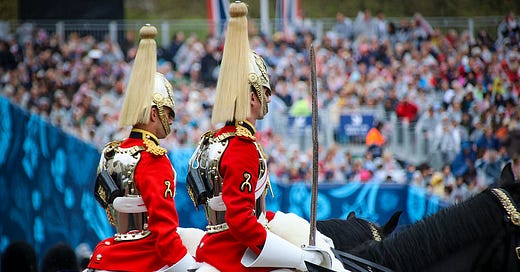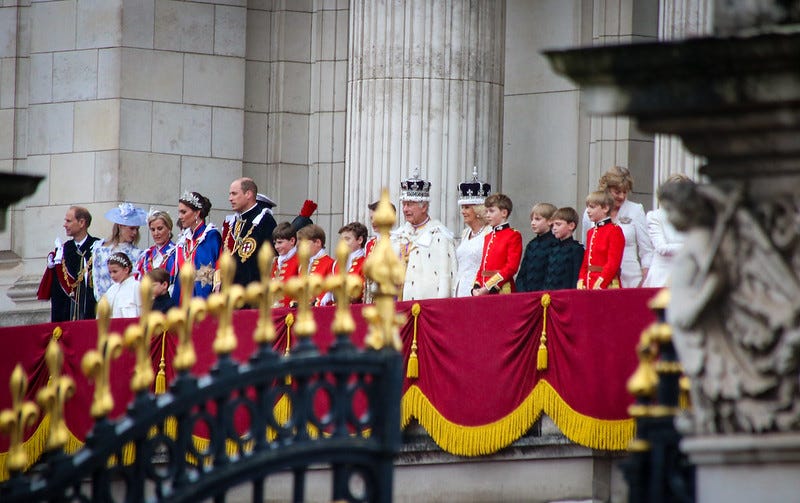Year Zero, And The Destruction Of Our Inheritance
The Year Zero mindset dissolves all relationships because they’re inconvenient and in the way of the new society
Editor’s Note: The essay below is adopted from a speech United Kingdom Common Sense Society Director Emma Webb gave at the National Conservative Conference in London earlier this month.
May was an historic month. The British public saw in real time for the first time a King of England crowned. We got to witness a ceremony that was forged over more than a thousand years, from before the Glorious Revolution (that explains the Protestant bit), before the Anglo-Saxon Kings, and further before to Solomon’s anointing by Zadok the priest.
May 11th was also the 1050th anniversary of King Edgar’s coronation. At that time, the antiphon—“Zadok the Priest”—is documented as having been sung at Anglo-Saxon coronations at that very moment of anointing. We saw the same with our own eyes, albeit to Handel’s rendition.
King Charles III's coronation procession. Photo by Pail Clarke/Department of Culture, Media & Sport/Flickr.
I’m curious to know a back-of-the-envelope calculation of what percentage of the world’s nations existed at the time when these traditions of ours were forged.
Our invaluable historic treasures are not all jewels, artefacts, statues, works of art, buildings, or physical things. Our traditions are the crown of our inheritance. These traditions have ancient roots, nourished by Christianity, bound up with the lives of all those who have since been forgotten, tangled with things that stand in tension, beautiful because they’re real, because they’re ours, woven together by the passage of time. They are organic matter.
In tradition, history is made flesh as a living breathing thing, of which we are all a part. It is the artwork of the Burkean contract between the unborn, the living, and the dead that we have heard so much about.
After Charles’s coronation, I made the mistake of watching the coronations of George VI and our late Queen. The decline is frankly devastating. It is a decline in execution, in style, and in reverence. By contrast, Charles’s coronation felt like crumbs. It was glorious, for sure, but apologetic.
I felt sad watching those images, I felt sad as I’m sure do many of you. It’s a sadness that dare not speak its name; we’ve all found ways to anaesthetise it. Why is it so hard even for us, as conservatives, or traditionalists, to face it fully? Because it’s raw and painful. It’s painful to stop for a moment and fully recognise the scale of our self-inflicted loss. To recognise that the generations who came before us have thrown away our precious inheritance, and that those around are vandalising what little is left.
So, with dread, we wonder what might get served up at the next coronation?
Prince William is already being advised to start thinking about redesigning the whole affair to ensure it is sufficiently “modern.” It’ll be a coronation for a post-Christian, post-Anglican Britain.
Catherine Pepinster was quoted in the Telegraph asking, “Can the sort of uber-religious ceremony we’ve just seen, with its prayers, hymns, chants, and a monarch dressed up as a priest for the crowning, and its Communion service, be remotely relatable?”
These words “relatable” and “modern” are ubiquitous. Everything needs to be modern or relevant today. Nothing from the past has any place in the future. These are stifling, meaningless words, yet we have given them definitive, normative weight that they don’t deserve. They are lazy words that we have allowed to diminish our agency and judgement by forcing a sense of inevitability on us.
The royal balcony at King Charles III's coronation. Photo by Pail Clarke/Department of Culture, Media & Sport/Flickr.
We are told that the Prince and Princess of Wales are reaching out to “GenZ,” the TikTok generation. The press have been citing a poll that found seventy-three percent of the country felt the royal family needed to “modernize” to survive. What does that mean? It’s as if they think the Royal Family needs to campaign to constituencies like politicians. Campaigning demeans the institution, and in turn, demeans us as a people. It’s needy and undignified.
Was the Queen modern? No, she was loved. Is the pomp and pageantry relatable? No, of course not—it is beautiful and out of the ordinary, and it is loved.
The demands placed on our heritage are unreasonable, and frankly, philistine. It is impossible for the value of our precious inheritance to justify itself in these terms.
By now, from Mao and the Cultural Revolution’s destruction of the “four olds”—ideas, habits, culture and customs—we know about the revolutionaries and activists’ need for a Year Zero. We are familiar with the necessity to raze everything precious to the ground because it’s in the way of building the new society from scratch, according to the blueprint of someone who knows best. But there is another, more subtle Year Zero. It is a mindset: the zeitgeist’s endless present. We see it in that prescriptive use of the word “modernity.” And the Conservative Party are just as guilty as anyone.
“Modernity” has become a euphemism for the tabula rasa, the endless present “year zero.” Modernity is a utopia, an abstract, nowhere place, borderless, and immune from the particular.
Michael Oakeshott has been criminally underquoted at this conference so let me overcompensate. He diagnosed this as a Rationalist problem. The Rationalist has a deep distrust of time and an impatient hunger for eternity.
Each generation, indeed each administration, should see unrolled before it the blank sheet of infinite possibility. And if by chance this tabula rasa has been defaced by the irrational scribblings of tradition-ridden ancestors, then the task of the Rationalist is to scrub it clean.
The Rationalist’s mind, Oakeshott says, has “no atmosphere.”
For Oakeshott, ideology “can be taught best to those whose minds are empty; and if it is to be taught to one who already believes something, the first step of the teacher must be to administer a purge.” He goes on to say:
The predicament of our time [and he was writing in the 1960s] is that the Rationalists have been at work for so long on their project of drawing off the liquid in which our moral ideals were suspended (and pouring it away as worthless) that we are left only with the dry and gritty residue which chokes us as we try to take it down.
Such a society is one that is “never mentally at peace with itself because it is never reconciled with its past” filled with men who are incapable of appreciating “the concrete detail of their total inheritance.”
The Household Cavalry at the king's coronation. Photo by Pail Clarke/Department of Culture, Media & Sport/Flickr.
The psychiatrist Iain McGilchrist recently noted that music is powerful: it can change your life, but it is just notes; a note is nothing; yet thirty thousand nothings make up Bach’s Mass in b minor. His point was that relationships are primary. Beauty emerges from those relationships. Things only become what they are because of the relationships in which they stand.
I think the same is true of history, of society, and of a people. Every people and culture is a symphony played over many centuries. It gives each culture its different textures and treasures.
But now, we have become dissonant. You see, the Year Zero mindset can’t compute these relationships. It lives in the abstract present. It doesn’t speak the same language. It’s antithetical to an honest organic understanding of history and our place in it.
As Danny Kruger said, we are not born free, we are born attached. We are bounded, limited, fallible creatures. Sir Roger Scruton said: “We are needy creatures, and our greatest need is for home—the place we are, where we find protection and love.”
For anyone who might need this translated into Postmodern, I’m saying abstraction is violence. The Year Zero mindset dissolves all relationships because they’re inconvenient and in the way of the new society. Those relationships–the ones that move us, motivate us, and make us not-nothing, are scattered by the endless present.
When I interviewed Jacob Rees Mogg, M.P., recently for a Spectator piece, he said this about the aesthetics of Parliament:
The people who would like a Year Zero and are ashamed of our history would like us to have an office building of the routine kind. Why would they like that? Because you don’t have a sense of continuity and history and tradition, and it’s much easier to be ashamed of something with which you’re not linked. Whereas we are linked in our daily lives, through the buildings we work in, with the nation’s history.
Year Zero is reborn every minute of the day. It’s a prison.
Look at what happened in Oldham recently. The Council demolished a beautiful Victorian church because they said that if they didn’t it would get vandalised. They are the vandals! And our treasures are in the hands of vandals. Those who are supposed to be caretakers of our inheritance can’t be trusted.
Crowds at King Charles III's coronation procession. Photo by Sophie Johnstone/Department of Culture, Media & Sport/Flickr.
Now, you will forgive me for reading out a long quote—because that long quote, again, is from Sir Roger Scruton. And the truth is, and I am sure you will all agree, I wish he were here to advise us:
The old way of teaching the humanities was in that manner—as objects of love. This is what I have loved, what previous generations have loved too and handed onto me. Here, try it out, and you will love it too. Whereas the postmodern curriculum is a curriculum of hatred. It’s directed against our cultural inheritance. One after another the works are paraded before us, stripped naked and thrashed….
Conservatism is not an ideology. It is a habit of heart. And its foundation is affection.
National Conservatism is about love— and love isn’t a zero sum game. As Yoram pointed out, appreciating and conserving what is your own does not prevent you from appreciating others, and what uniquely is theirs.
This inheritance is not ours to sell-out. It belongs to the future, and we have a duty to it. We need to reject the vandals’ claims of inevitability. We must not allow the endless present to rob us blind.









What a lovely piece. Well done.
It is devastating that the mindset today is: do away with anything from the past. Past = bad, future = good because progressivism. But what are we progressing towards? It seems to be only abject hatred and dismissal these days. I believe it is all part of a plan to dismantle the beauty of Western civ to further drag us into a grey blob under an iron fist of nouveau Communism.